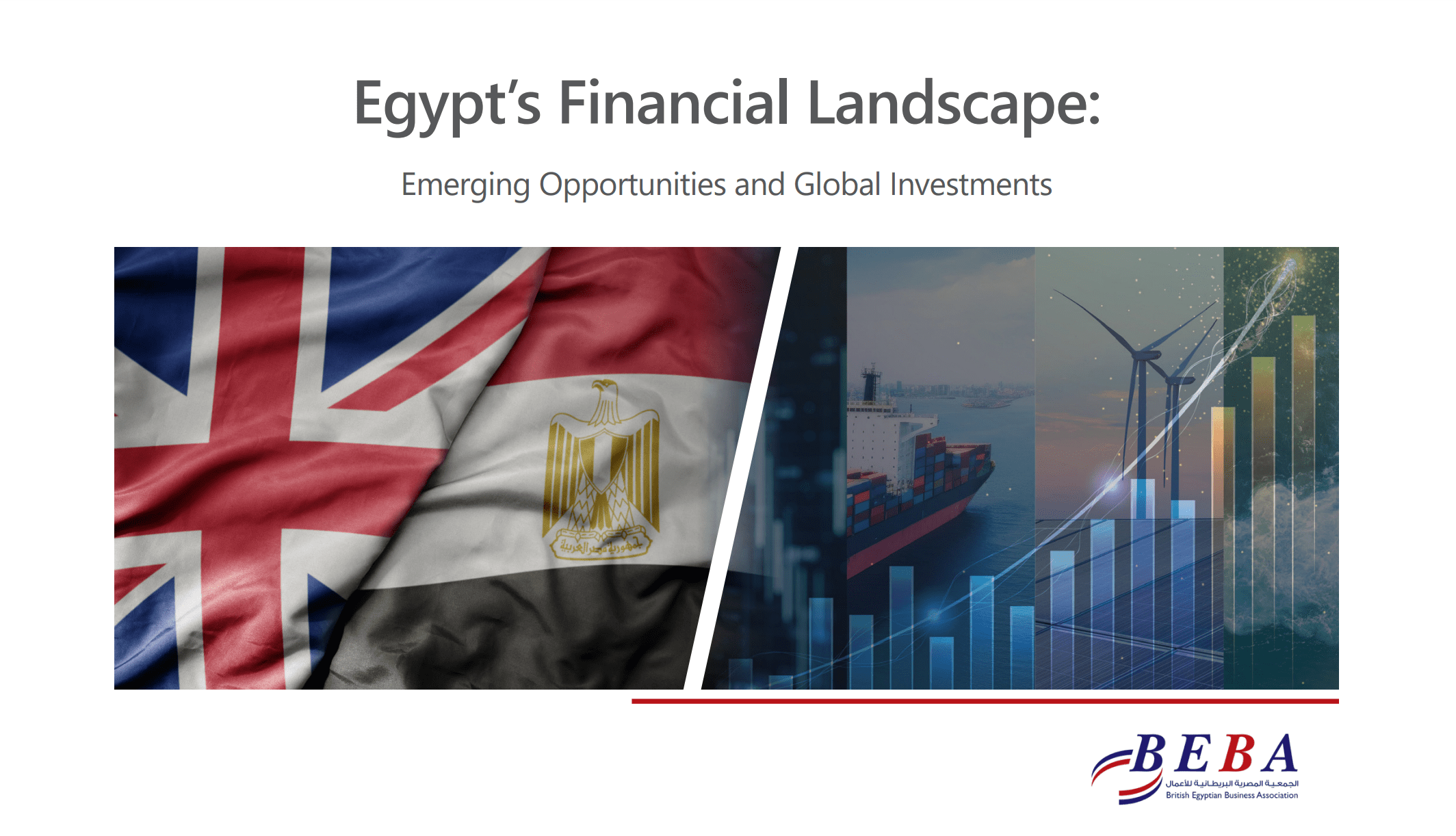
BEBA Annual Business Mission to the UK- September 18-20, 2024
Egypt is at a crucial juncture in its economic transformation, with significant reforms underway and growing global investment
interest. The recent IMF review and the upcoming BEBA Business Mission to the UK highlight the interconnectedness of these
developments, offering insights into Egypt’s future economic direction.
IMF Endorses Egypt’s Progress: A Positive Outlook for Economic Stability
On July 29, 2024, the IMF Executive Board completed its third review of Egypt’s Extended Fund Facility (EFF), unlocking approximately
$820 million for immediate disbursement. This milestone reflects international confidence in Egypt’s economic trajectory. Since the
earlier combined reviews in March, Egypt has made notable progress in stabilising its economy: inflation is easing, foreign exchange
shortages have been resolved, and key fiscal targets have been met.
Antoinette M. Sayeh, Deputy Managing Director and Acting Chair of the IMF, praised Egypt’s efforts but emphasised the need for
ongoing policy measures to maintain macroeconomic stability. She highlighted the importance of continued structural reforms to
enhance tax revenue, strengthen debt management, and foster private sector growth. The IMF’s endorsement is not just a validation
of past efforts but also a reminder of the critical need for Egypt to stay the course on its reform agenda.
However, significant challenges remain. According to the IMF report, Egypt’s debt-to-GDP ratio is projected to be approximately
**93%** in 2024 (IMF, 2024 Article IV Consultation – Press Release; Staff Report, p. 21), and over a quarter of its population lives
in poverty. While investor confidence is rising, sustaining this momentum will require the government to continue implementing
its promised reforms. The IMF has been clear: maintaining a flexible exchange rate, continuing fiscal consolidation, and advancing
structural reforms are crucial for sustainable growth and long-term economic stability.
Strategic Economic Transformation: Attracting Global Investment
Egypt is increasingly seen as a prime destination for foreign direct investment (FDI), driven by its strategic geographic location, substantial market size, and commitment to economic reforms. The recent devaluation of the Egyptian pound has made the country an attractive destination for investors seeking cost-effective opportunities. Economist David Lubin notes that the relatively low cost of investment in Egypt compared to Europe is a significant draw for international companies.
The government’s alignment with IMF guidelines, particularly its pledge to maintain a flexible exchange rate and reduce the military’s influence in the economy, has been crucial in creating a more favourable investment climate. These reforms are expected to further enhance Egypt’s appeal to foreign investors, ensuring long-term economic stability.

Navigating Challenges: The Road Ahead
Despite positive developments, Egypt faces significant hurdles that could impede its economic progress. High debt levels and
widespread poverty remain critical issues. Economic growth has been sluggish, and the success of recent investment pledges will
largely depend on the government’s ability to deliver on its reform promises.
Domestic business interests, particularly those linked to the military, may resist the increased presence of foreign companies in the
market. Additionally, the government’s adherence to the IMF’s demands, such as maintaining a flexible exchange rate and setting a
credible inflation target, will be critical to sustaining investor confidence. Robert Mogielnicki, a senior research scholar at the Arab
Gulf States Institute in Washington, DC, warns that without tangible progress on these fronts, Egypt risks undermining investor
confidence and slowing the influx of much-needed foreign capital.
Financial Stability: Positive Trends in Egypt’s Banking Sector
In a positive sign for Egypt’s financial stability, the Central Bank of Egypt (CBE) reported an increase in the country’s net foreign
assets, reaching EGP 508.58 billion in July 2024. This turnaround, with the banking system shifting into surplus territory for the first
time since March 2022, is crucial for maintaining financial stability and managing external shocks. However, the slight decrease in
foreign currency reserves, from $36.9 billion in June to $36.3 billion in July, indicates the need for careful management of foreign
exchange resources to ensure ongoing economic stability.
Connecting the Dots: BEBA Business Mission to the UK
These developments will be central to discussions at the upcoming Business Mission to the UK, organised by the British Egyptian
Business Association (BEBA) under the theme “Invest in Egypt: Your Gateway to Growth.” Scheduled for September 18-20, 2024;
the mission will bring together key government figures, including HE Ahmed Kouchouk, Minister of Finance; HE Hassan El Khatib,
Minister of Investment and Foreign Trade, HE Dr. Mohamed Farid, Executive Chairman of the Financial Regulatory Authority (FRA),
Rami Aboul Naga, Deputy Governor, Central Bank of Egypt, HE Waleed Gamal Eldin, Chairman, Suez Canal Economic Zone and HE
Khaled Abbas, Chairman & CEO, Administrative Capital for Urban Developments (ACUD).

“The interest we have seen from clients and global investors in the different international roadshows we have organised underscore how highly they regard future opportunities in Egypt. This year’s delegation is very important as it is an opportunity to consider Egypt’s economic reform programme in view of evolving global circumstances and to support the government’s ambitions to attract more foreign direct investment”, said Todd Wilcox, HSBC Egypt CEO.
This ministerial session will provide a platform for Egyptian leaders to highlight the country’s economic progress and ongoing reforms, as endorsed by the IMF. The discussion will focus on how Egypt is navigating global geopolitical tensions and economic shocks while remaining committed to its economic strategy of attracting FDI, diversifying revenue streams, promoting private sector growth, and modernising regulatory frameworks.
The ministers will underscore Egypt’s focus on priority sectors for investment, such as energy, infrastructure, manufacturing, and information and communications technology. These sectors are central to the economic reforms that have been instrumental in stabilising Egypt’s economy and positioning it as a key player in the global market. The session will also explore reforms in the Non-Banking Financial Institutions (NBFI) space and the associated investment opportunities, reinforcing the message that Egypt is open for business and ready to engage with international investors.
The BEBA Business Mission to the UK will be a crucial moment for Egypt to showcase its progress and future plans, providing a unique opportunity for investors to engage directly with the policymakers shaping Egypt’s economic future. The synchronisation between the IMF’s positive outlook and the discussions at this event will reinforce Egypt’s position as a rising star in the global investment arena.

